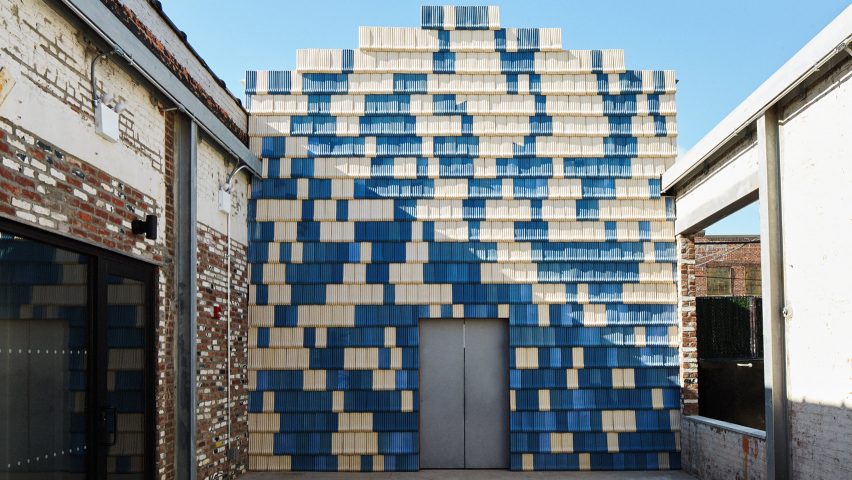UK collective Assemble has built a temporary factory at the A/D/O creative space in Greenpoint, Brooklyn, and clad its front with tiles made inside.
For its first US project, Assemble – which won the Turner Prize in 2015 – have created a project titled A Factory As It Might Be.
It involved taking over an open-air section of the warehouse building that now houses A/D/O – the MINI-backed creative hub, which opened in December 2016 after a conversion by nArchitects.
Over this small space, Assemble erected a galvanised steel structure on top of the brick walls, creating a temporary roof but leaving one side facing into a courtyard open.
After acquiring an industrial clay extruder – which pushes the soft material through holes in metal plates to create different shapes – and an electric kiln for the space, they began experimenting with different possibilities.
This led to the creation of vessels, homeware and other clay pieces, but the tiles were deemed the most successful.
Once a design was refined, production began and the ceramic shingles were added to a frame as they were made.
The result is a wall covered in a patchwork of blue- and beige-toned tiles, similar to the colourful front of the Yardhouse creative studios that Assemble built in east London in 2014.
A Factory As It Might Be also borrows elements from another of the collective's projects: the same principle of on-site production forms the basis of the Granby Workshop social enterprise.
As part of the regeneration of a street in Liverpool, UK, Assemble worked with local craftspeople to create and sell homeware. The group became the first architects to win the coveted Turner art prize for the initiative.
Members of Granby Workshop assisted in the development of the factory in New York, and served as instructors for the machinery.
In turn, the skills developed during the residency at A/D/O will be fed back into the project in Liverpool.
"We are interested in how utopian ideas can be applied to the very practical reality of construction, and how building elements – and their method of production – can become an expression of social, economic and political aspirations," said Assemble founding member Lewis Jones.
At A/D/O, the team have been teaching the local community how to use the equipment so they can continue production after the project officially ends in late April 2017.
The project forms part of inaugural programming series at the newly formed institute's Design Academy, titled Utopia vs Dystopia: Designing Our Imagined Futures – which kicked off with a three-day festival last month.
"Assemble's interest in the broader implications of their work and the potential for design to have real-world impact strongly resonates with the core tenants of the Design Academy," said A/D/O design director Daniel Pittman.
"The team has successfully framed A Factory As It Might Be as a conduit for collaboration, and we're excited to see how this project unfolds within the growing community at A/D/O."
Photography is by Sam Nixon.

